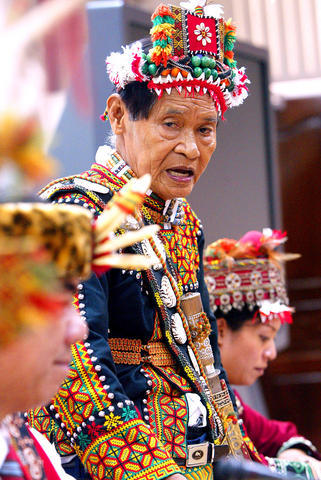Descendents of "Princess Bannen" of the Rukai tribe yesterday called the popular myth about the princess an unauthorized rewriting of a true story in the tribe's history.
Dozens of Rukai tribesmen joined the protest at a press conference held at the legislature yesterday.
In recent years, the myth of Princess Bannen has not only been used in a computer game, but also turned into a pop song.

PHOTO: CNA
One of the popularized versions of the Princess Bannen story recounts how a beautiful Rukai princess named Bannen fell in love with Prince Hundred-Pacer Snake and wanted to marry him.
Bannen's parents were angry since they didn't want their daughter to marry a snake. However, they couldn't directly refuse the marriage for fear of angering their ancestral spirits, because Rukai people believed themselves to be descendents of the hundred-pacer snake.
Therefore, Bannen's parents listed several difficult tasks for the prince to complete before granting their permission for the marriage.
The prince completed them all successfully. On the wedding day, Bannen followed the hundred-pacer snake into the sacred Talopalin Lake and was never seen again.
For the Rukai tribesmen and Bannen's descendents, the love story element is completely an outside creation.
"The real name of Princess Bannen was Limuasa. The real story was that Limuasa fell in love with a man from another tribe -- which was unacceptable for the Rukai at the time," said Dale Vag, an Amis man who married a descendent of Limuasa.
"The story happened about 260 years ago, and for the Rukais at the time, marriage with someone from another tribe was shameful," said Lakuduvia Muni, a 13th-generation descendent from Limuasa's family.
To agree to the marriage, Limuasa's parents posed several challenges to the man.
After he had completed all the challenges, permission to marry was granted, Muni said.
As agreed, the man married Limuasa. But since Limuasa felt guilty toward her parents, the couple committed suicide a few days later by the Talopalin Lake, Muni said.
"No one consulted us when they rewrote the story, which was disrespectful," Muni said. "I'd like to ask the government to help preserve tribal culture -- which includes our right to tell the story."
At a separate venue, Council of Indigenous Peoples Minister Icyang Parod said he supported Muni's request.
He also said that the council has drafted a bill specifically aimed at protecting traditional and original Aboriginal stories and music.
The bill is currently in the legislative backlog, Icyang added.

Alain Robert, known as the "French Spider-Man," praised Alex Honnold as exceptionally well-prepared after the US climber completed a free solo ascent of Taipei 101 yesterday. Robert said Honnold's ascent of the 508m-tall skyscraper in just more than one-and-a-half hours without using safety ropes or equipment was a remarkable achievement. "This is my life," he said in an interview conducted in French, adding that he liked the feeling of being "on the edge of danger." The 63-year-old Frenchman climbed Taipei 101 using ropes in December 2004, taking about four hours to reach the top. On a one-to-10 scale of difficulty, Robert said Taipei 101

Nipah virus infection is to be officially listed as a category 5 notifiable infectious disease in Taiwan in March, while clinical treatment guidelines are being formulated, the Centers for Disease Control (CDC) said yesterday. With Nipah infections being reported in other countries and considering its relatively high fatality rate, the centers on Jan. 16 announced that it would be listed as a notifiable infectious disease to bolster the nation’s systematic early warning system and increase public awareness, the CDC said. Bangladesh reported four fatal cases last year in separate districts, with three linked to raw date palm sap consumption, CDC Epidemic Intelligence

Two Taiwanese prosecutors were questioned by Chinese security personnel at their hotel during a trip to China’s Henan Province this month, the Mainland Affairs Council (MAC) said yesterday. The officers had personal information on the prosecutors, including “when they were assigned to their posts, their work locations and job titles,” MAC Deputy Minister and spokesman Liang Wen-chieh (梁文傑) said. On top of asking about their agencies and positions, the officers also questioned the prosecutors about the Cross-Strait Joint Crime-Fighting and Judicial Mutual Assistance Agreement, a pact that serves as the framework for Taiwan-China cooperation on combating crime and providing judicial assistance, Liang

US climber Alex Honnold left Taiwan this morning a day after completing a free-solo ascent of Taipei 101, a feat that drew cheers from onlookers and gained widespread international attention. Honnold yesterday scaled the 101-story skyscraper without a rope or safety harness. The climb — the highest urban free-solo ascent ever attempted — took just more than 90 minutes and was streamed live on Netflix. It was covered by major international news outlets including CNN, the New York Times, the Guardian and the Wall Street Journal. As Honnold prepared to leave Taiwan today, he attracted a crowd when he and his wife, Sanni,